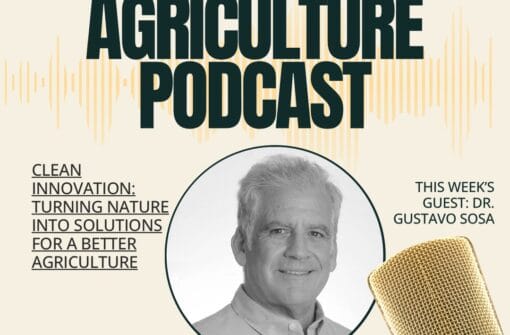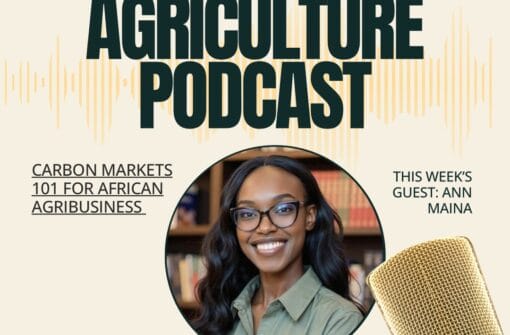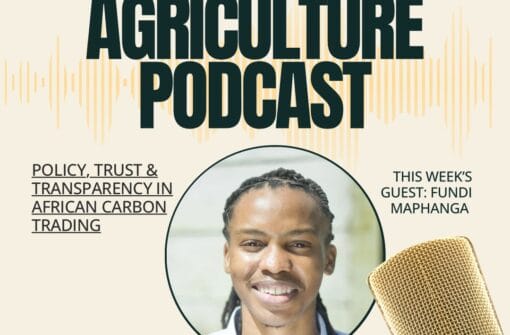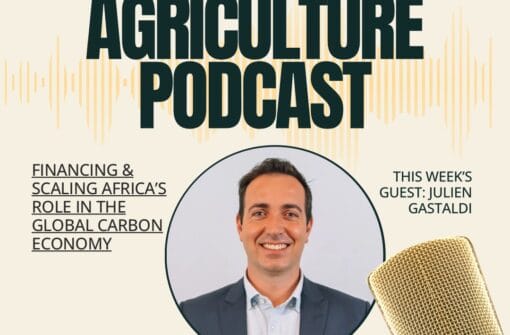Episode Description
The Nigerian government has announced a ₦5bn agro-inputs distribution plan — promising to get fertilisers, seeds, and agro-chemicals into the hands of farmers. But will this intervention truly reach those who need it most, or will it get stuck in the same old bottlenecks of politics, logistics, and poor timing?
In this episode, I sit with Ilyasu Ishak, Business Development Manager at CropIT, to unpack the realities on the ground:
- How effective input distribution can transform yields
- Why timing is critical for farmers’ success
- The risks of leakages and mismanagement
- What lessons Nigeria can borrow from past interventions
This is a must-listen for anyone following agricultural policy, agribusiness, or the future of food security in Nigeria.
Produced by LTA Studio
Looking to launch or grow your podcast? At LTA Studio, we help organizations and thought leaders tell powerful stories that reach the right audience. From production to promotion, we’ve got you covered. Email us at studio@letstalkagriculture.com

Transcription
Ilyasu Isak: [00:00:00] Beautiful people. Indeed. That is one of my biggest pleasure is always when I went to my own farm. So, I think it’s important to first understand what a healthy relationship with food is for us to know what it’s not.
Sharon Idahosa: Not trying to, I can relate. I can relate selfish. So you could be your own farmer for.
Who knows. Trust. Trust me when I tell you, there will always be challenges, there will always be risks. Seems like we have a lot in common. Welcome to the Lets Talk Agriculture podcast show, and of course it’s your favorite girl show here.
Across Nigeria, the government is putting money into farming again. Recently a pilot program worth almost 20 billion naira was launched to help farmers with agri input such as fertilizers, seeds, and crop protection products, about 50,000 farmers are supposed to benefit from this. I mean, [00:01:00] this idea is pretty much simple.
The government pays half, farmers pay the other half later when they sell their crops. Now, this new approach is also trying to do things differently because farmers are being registered properly with their ID numbers, their farms are being mapped, and women and youths are also given special focus, and there is also a digital system that has been set up so that inputs can be tracked in real time.
Now this sounds like a very good progress from the government side, but history tells us that getting this input from warehouses into the hands of the real farmers is where the problem usually starts. Now, sometimes these inputs can be diverted, sometimes they can arrive late, and sometimes farmers don’t even know when to expect them.
So today we are asking, will the new 5 billion naira agri input plan work or will it face the same old challenges? Now, my guess for today is someone who wears many hats in the agriculture space, he is a farmer himself, a researcher, [00:02:00] and an agribusiness professional who has spent years working on solutions that connect farmers with the tools they need to succeed.
He’s led agribusiness firms, contributed to conversations on reducing post-harvest losses, and continues to breed technology with farming realities through his work in the private sector. Please join me welcome my very good friend Ilyasu Isah Ishak, a business development manager at corporate in Nigeria, and a strong voice on how Nigeria can get agriculture support. Right. Thank you so much for joining this morning. How are you doing today?
Ilyasu Isak: Thank you, Sharon. It’s always, um, good to speak with you. I’m doing good. Hope you are too?
Sharon Idahosa: Yes. Thank you so much for asking. Thank you. So, let’s get right into the conversation. I mean, I, I, I need answers to some questions and I’m glad to have you here today.
So first, who exactly are the farmers meant to benefit from this plan and how? And how are they being chosen? [00:03:00]
Ilyasu Isak: Um, so, um, though I don’t work for the government and I cannot speak for them, um, I would try to share my own, um, you know, insight on the, on the discussion.
Sharon Idahosa: Okay.
Ilyasu Isak: Um, certainly the government is intending to support smallholder farmers, you know, um, across the country, particularly, uh, on the, um, focus crops, which are rice, maize, wheat, cassava.
Uh and Soya Beach and these farmers are meant to be, um, you know, chosen from, from, the respective state that the program is going to be implemented. So Federal Ministry of Agriculture is working with the various ministries of agriculture in the states. To identify farmers that would benefit under this program.
Um, therefore, [00:04:00] as to, uh, what I know they are getting the families from the, uh, relevant, uh, government institutions in the various states.
Sharon Idahosa: Okay. Thank you for sharing that. I think that’s a, that’s, um, a really bold move. Um. Going through the states individually and getting at least mapping out, um, the farmers in those regions.
So I think that’s, that’s a great move from, from the government side, and hopefully we can see the results, right? So in the past, we’ve seen input arrive very late, you know, sometimes after the planting season. So I just want to know what is being done differently this time to make sure that farmers, they get it on time.
Because I know you agree with me that this is, uh, a challenge for many farmers and this is what we hear often saying, oh, I never got the, the, the seeds or the inputs that were promised. I mean, I had already completed my planting [00:05:00] season and all that. So I just want to hear your thoughts on this.
Ilyasu Isak: You know government, um, um, uh, you know, has, um, you know has deployed technology.
I mean, relevant service providers that are deploying, uh, technology in the distribution of this input. But, um, I think, um, in my own honest opinion, um, I mean, it’s still not very sufficient and not very efficient because yet government is delaying in the distribution of this input to the farmers. You know, I think this is something that we as a people and we as, um, country
must really be deliberate about how we can address this issue of getting input to farmers Lead. Um, with government program, there is always, you know, [00:06:00] challenges, uh, one challenges to other government processes and bureaucracy that are aiding in the delay the delayed distribution of, of this input, which, you know, contribute significantly in the performance, I mean, in a negative way on the performance of the program itself.
So. Yes. What, uh, is being done differently is, this time around is government is using technology, government is using some selected service providers. Government is selecting, is using selected service providers that are using technology, uh, in distribution of this input. But using technology or deploying technology alone cannot solve the whole problem.
We need to look at other institutional challenges, other institutional problems that are causing the delayed distribution of the, of the input, which is, like I [00:07:00] said, um, one of the major thing that, um, impact the performance on the project
Sharon Idahosa: Okay. Thank you so much for sharing that. Um, we are saying that technology, that, uh, technology is not going to solve all of this right now.
And there has to be, there has to be more to be done, that there’s more to be done. So. I’m just wondering where
Ilyasu Isak: Technology is just one piece.
Sharon Idahosa: It’s just one.
Ilyasu Isak: So technology is just one piece.
Sharon Idahosa: Mm.
Ilyasu Isak: You have the, you know, so how is this technology being deployed or being utilized in this process? Is in the registration, monitoring and management of the beneficiaries. That is the farmers. So, someone has to identify the farmer. Someone has to present the farmer’s data. Mm. So you’re only using technology in collecting the data. Collecting data. Technology is not creating the data. It cannot create the data. It cannot create farmers.
So it can only collect [00:08:00] information of the farmers. And you know, it can also, it can only, I mean, it can also be used in evaluating. Uh, you know, the progress of the, of the performance of the program.
Sharon Idahosa: Of the program.
Ilyasu Isak: It’ll, it can also be used in, um, managing the ecosystem that is managing the movement of the input from the warehouses of the input suppliers to the hands of the farmers.
This is what technology can only do. But if the input itself has not been moved, technology cannot capture the movement, cannot monitor the movement, cannot evaluate the, the, the, the, the efficiency or the effectiveness of the process. So, technology is just one piece and for me it just is small piece. It’s not even the
Sharon Idahosa: Right.
Ilyasu Isak: uh, uh, you know, a big piece, uh, in the [00:09:00] whole, um, the positive, um, issue. Yeah. Yeah, exactly. So. Um, how, what are the protocol or procedures in identifying the farmers on time? I made mention that I, based on what I know, uh, I mean, uh, this is, like I said, based on what I know, I, I’m not speaking for the government.
Sharon Idahosa: Mm-hmm.
Ilyasu Isak: But based on the available information out there that I gathered Ministry of Agriculture, who is implementing this program. Is working with the various, uh, government, uh, relevant government, uh, agencies in various state in identifying the farmers and registering the farmers. This is also, this could be good and could be, you know, uh, and could be bad.
Sharon Idahosa: Mm-hmm. Yes. Yeah. I’m thinking too.
Ilyasu Isak: Using the government. Yeah, using the government, using the subnationals and even sometimes, um, the government agencies. At the [00:10:00] subnational level can help because yes, they have more access. They are closer to the farmers than the Ministry of Agriculture itself but it can create a scenario whereby we can, we will continue to see the repetition of what has always been for most, for most of the times that is,
Sharon Idahosa: mm-hmm.
Ilyasu Isak: For who we call political farmers to be, to be to be onboarded and to be supported instead of the real farmers.
Sharon Idahosa: Exactly. That was just what I was thinking myself. That’s why I was sorry, so that I was just thinking that yes, technology, just like you said, can do this, can onboard the farmers, but can it really meet the actual farmers because anybody can just um, get list of the, their political farmers or how, how do we say it now? They can just get their own list of farmers and
Ilyasu Isak: Exactly, exactly.
Sharon Idahosa: inputs [00:11:00] the data as well. So at the end of the day, you are not connecting with the actual farmers. So, I, I, I still think that maybe it’ll be good to work with the, um, leaders, the cooperative leaders.
I don’t know, um, the community leaders. I mean, you know, many farmers are Incorporated, so, okay.
Ilyasu Isak: So there is no, for me, there is no, um, better option of doing anything. Okay. Um, what the most important thing is for us to, um, uh, sort of, um, be true to ourselves working with farmer cooperative also has proven to be disastrous sometimes.
Oh, wow. So, it’s not really about the system. It’s not really about the system. And like I said, I’m not speaking for anybody. I’m giving my, uh, candid, uh, opinion and position on these things. So, there is no, there is no good or [00:12:00] bad system. Um, our intention, our commitment, our. You know, uh, will in doing the right thing is the most important here.
Um, we have seen where, you know, uh, associations, you know, farmer cooperatives were used in identifying farmers and um, uh, and, and, and, and in supporting these farmers and we have seen, um, the outcome also the performance of that. They also, you know, because you do not expect an organization that doesn’t have a strong governance structure to be able to manage any program well, and I am, I am part of so many of these association when government need to work on [00:13:00] enhancing their capacity, particularly in respect to governance structure.
So. For me, government is, has been spending money, building capacity of cooperative or, you know, uh, association, uh, on the technical aspect of agriculture. For God’s sake, that’s their business. That’s what they know how to do best. So they know I mean, even though there are innovation, there are new technology, yes you can, it’s good for you to train or to build one’s capacity in respect to that.
But there are a, a critical aspect that they are lacking, which is leadership and governance structure. Without a strong leadership in this association and cooperatives and farmer cooperative, and a strong governance structure. You do not expect them to be able to manage such program? Well, we have seen, um, previous, [00:14:00] uh, intervention in the agricultural space where, like I said, association were use.
Many of the association. Many of the beneficiaries that have really benefited from those programs were first time farmers.
Sharon Idahosa: Hmm.
Ilyasu Isak: Why? Because the association did not even had a database of that amount, that number of farmers prior to that program. So all of these association without any exception, quote me anywhere without any, uh, exception
didn’t have the number of farmers they have now prior to the, to those, uh, interventions that were, um, you know, that were implemented previously. So, meaning it was the intervention that has moved this association in onboarding and registering more farmers. And [00:15:00] that is already, uh, a factor that will, you know, that will, you know, encourage, encourage inaccuracy in data collection, uh, that will encourage corruption.
That will encourage inefficiencies because your goal is, let me get members as much as possible so that. I, I, I can increase the number of my beneficiaries. So, this speaks to the poor governance structure. Look, we need to be honest with ourselves. I am part of this association. I have spent more than a decade advocating, promoting this association.
I am leading some of this association, but this is the pure fact we must begin to look at these issues and be true to ourselves by identifying these problems and by, by addressing these problems. That’s why I said [00:16:00] I can, I, I, I don’t need to start mentioning names of the association, but without any exception, take any association you want, uh, evaluate the membership trend, uh, pre 2017 and post 2017, and you can see the difference.
It’s not doubling or tripling is, you know, uh, multiplying in in tenfold. Tenfold. So just to tell you that what what was driving the growth in membership was really just the intervention, the, uh, the interest of keening into some of those intervention. So, there is no good way or bad way of working with, with, uh, I mean, there is no better system, uh, of reaching these farmers.
Any system you take, whether, uh, uh, using government to register the farmers or using association to register the farmers, it’ll all come [00:17:00] down to, you know, the intention. It’ll all come down to, um, the political will of ensuring the right thing is being done. Both systems can encourage corruption in, in, in, in registering and onboarding or in first identifying, registering and onboarding the farmers.
Sharon Idahosa: Thank you so much.
Ilyasu Isak: And technology cannot really address this in totality, right? Yes. Technology can help in be in purifying the data that will be submitted. Yes, technology is excellent in doing that, but technology will only use what the computer right. Is, is, let me use my, you know, it can be school definition of computer.
‘Computer system is garbage and garbage out.’ What you give into a computer system, is it what it’ll give you back, it’ll only help you in processing it. Mm-hmm. So I’m not, you know, downplaying the importance of technology, but I’m just saying [00:18:00] that there are other things that need to be put Right. For the technology to even work efficiently.
Sharon Idahosa: Yes, I understand. Yes. Now we have to really set it down to, to figure that out really, because otherwise we might just be doing things. Yes, it’s coming from a place of goodwill for the farmers, but I mean, if we don’t do things in the right way or in, I mean, just try to look out for the loopholes and try to, to start fixing it from that end.
I think technology might not do, might not do that much. Um, that’s, that’s absolutely, that’s, that’s just my own thoughts on this. So another challenge I see here is quality. You know, how do we know that these fertilizers or the chemicals are genuine? I mean, maybe they’re expired or, or they’re fake because these are also considered, um, challenges, I mean, for some of these, um, programs, interventions.
So I just want to get your thoughts on this.
Ilyasu Isak: Yeah. So I said that we already have all the system in place to ensure that we do the right thing. [00:19:00] The challenge has always been our adherence to those procedures and utilization, efficient utilization of the systems. Yes, we have some, uh, quite a number of fertilizer blending plant.
Yes. Um, I support the government policy in encouraging, you know, local production of fertilizer. Great kudos to the administration of the late President Muhammadu Buhari, um, on establishing the Presidential Fertilizer Initiative, which has really, really supported the country in enhancing our own local production of fertilizer.
Uh, Nigeria right now is even exporting fertilizer with Dangote Roma leading, leading in that.
Sharon Idahosa: Oh, that’s impressive.
Ilyasu Isak: Yes. Um, by the way, Dangote Fertilizer is the second largest non oil export [00:20:00] in the first half of 2025. Oh. So more than 230 different commodities were exported in the first half of 2025. Ti was the second largest exported commodity.
So to tell you that Nigeria has really achieved soft sufficiency in fertilizer production to the extent that we’re even exporting. So, but we have more than 120 fertilizer blending plant fertilizer companies, medium to small scale, uh uh, at the same time, a few number of large scale.
But as a country, we have our standard organization, standard organizations of Nigeria. Is, is, is, um, is the agency started with responsibility of ensuring standard? How much are we, uh, adhering to the, uh, to the, um, standard protocol? How much are we enforcing quality testing? [00:21:00] We have both in government and from private sector, a good testing capability.
Like I said, you have SON, you have, you know, from private sector, we have blue pars, we have SIS inspection. We have quite a number of, you know, institutions, you know, that have testing capability. How much is government ensuring adherence? How much is government ensuring these quality testing and quality check is being done on the input they are procuring to give to the farmers?
So that, that is the question. It’s not about if we have that capability, it’s about is the common interested in making sure that it, it, it test the, it test the quality of the input it’s giving to the farmers because you are not helping the farmer if you give him, you know, a poor quality input because you’d rather allow him [00:22:00] to go and source for his input, even if he is draining his blood out to give out for in, in, in exchange of, for the input.
Rather than giving him a poor-quality input because you are making him lose, you are making him, you know, lose his time, lose his resources, you know, and you know, it, it retarding his productivity. Yes, you are retarding his productivity so.
And there is, um, a lot of concern from various quarters from the farmers themself and other stakeholders that some of these input that are been given to farmers are really not of very high quality. So, the question here is, are we really interested in ensuring, uh, we we enhance our agricultural productivity?
Are we really serious about farmers? That’s question. So. And, and we, we need to be honest to [00:23:00] ourselves. We need to be true to ourselves. That’s why I told you.
Sharon Idahosa: Mm-hmm.
Ilyasu Isak: It’s not about the system we have about
Sharon Idahosa: It’s not about the system.
Ilyasu Isak: We have the best of systems, the best of system. It’s about adherence, is about, um, sticking to the protocols, protocols and procedures.
Sharon Idahosa: Hmm. And I think that’s, that’s, that’s really going to be a long process really, because, I mean, this is something that, that, that has just been here for, for a very long time. I mean, so it’s not like, um, good things are not happening in the ag, in the ag sector or the government are not trying to do anything at all.
Right? It’s just still boil onto the fact that we don’t follow protocols, which is a major problem. I mean. I don’t just even talk about the ag sector, but I just see that this is a major problem.
Ilyasu Isak: The main problem, the main problem, which is also, um, very much applicable to the agriculture sector [00:24:00] in our, in the way we do things in this country, is lack of reward and punishment.
So, um, people just think that, okay, yeah, there will not be any repercussion for how many people. Yes. That’s a, that’s a problem. I have seen fertilizer I have with my own eyes. That is a bag of fertilizer that, that, that was just full of sand.
Sharon Idahosa: You can imagine.
Ilyasu Isak: This is something I have seen with my two. Not that anyone has told me.
No, I have seen that. And um, you know, that company is still producing,
Sharon Idahosa: they’re still producing, like I said.
Ilyasu Isak: Um, there is no repercussion, right? There is no, people just, um, are comfortable knowing that there, uh, there will not be any repercussion for their action. So there is no reward and punishment structure in the country.
And this is also, uh, affecting [00:25:00] the agricultural sector, you know, and it’s costing us, um, if, if, yes, if government give a particular company contract to supply input, that will be distributed to the farmers. They just know, oh, don’t worry. It, it for farmers. Just let’s, so they, they already have that comfort, that confident that they, no, it’s it’s government program. It’s for intervention.
Sharon Idahosa: The intervention. So it doesn’t have to be, be of standard.
Ilyasu Isak: We need to, we need to address that perception that we have.
Sharon Idahosa: We really need to, we, we really, really need to. But yeah. Let’s, let’s even talk about accountability, right? You know, so, I mean, what if something goes wrong? Just like we are saying the, the, the inputs are not good or the inputs are diverted.
I mean, what, what exactly is in place? What system is in place for accountability? Can farmers report or check what they should have received? [00:26:00] Is there something in place for this particular program?
Ilyasu Isak: For this particular program, I, I am not sure. Right. I’m not sure. Like I said, I do not work for the government, but of course when we talk about generally, we already have a system, whether it it has been incorporated in the program or it has not.
Farmers can always take advantage of that. We have a federal consumer, um, FCPC, right? Federal Consumer Protection Commission. Uh, so I mean, which, uh, very much, um, welcome any, you know, complaint or concern by any, uh, I mean by anyone you know, uh, on anything. So including even agricultural input. So I’m sure, uh, if this has been integrated in the program, but I know for, for, for, for, for setting that.
Farmers can, you know, leverage the fc, I mean FCPC, you [00:27:00] know, to, they can take their complaint to FCPC. And I want to encourage everyone who has received anything, um, whether under any government program or even if you go to the market to buy any input and you found that, uh, you found the input not to be of good quality,
I want to encourage us. To, you know, be interested in utilizing our right and approaching any close, any FCPC office close to us to submit our complaint. And, um, you know, uh, I have seen some of the airport FCPC have done in acting on people’s complain, and I have the confidence that they will continue to try their best.
So, I mean, I want to encourage people to. Um, you know, always try and follow things straight. Let’s have that, uh, let’s develop that attitude of ensuring that we [00:28:00] ensure people are doing the right thing. If we are not talking about it. If we are not doing anything about it, it means we are encouraging them to continue doing what they’re doing.
Sharon Idahosa: Hmm.
Ilyasu Isak: So we need to start to speak up. So I want to encourage farmers either on that, this particular government intervention, or even on their own, if for any reason you buy any input from anywhere, which is not of good quality, please, please go and submit your complaint to, uh, federal Consumer Protection Commission.
Sharon Idahosa: Great. Thank you so much. Thank you so much for, for sharing that. I think people should really take this up. So from what we’ve heard today, the 5 billion, our input plan will only succeed if it reaches the right people. I mean, on time and in the right quality. And of course, if people really follow protocols, because like I said, we already have systems in place.
We just need people to follow the right, the right spots, right. So for farmers that are listening, we would love to hear your stories. Have you [00:29:00] received government input in your in your area? Did they come on time? Were they useful? Please share your experience with us and we may feature your story in future episode.
Thank you so much, Yasu, for joining us today, and thank you for listening and the next time I remain your humble host, Sharon.
Ilyasu Isak: Thank you. Thank you for having me.
Sharon Idahosa: It’s a pleasure. Do well to subscribe to the Let’s Talk Agriculture podcast on Spotify, on Apple, or any listening platform that you choose. You can also visit our website; letstalk agriculture.com or podcast.letstalkagriculture.com. Do have a lovely time. Cheers.





